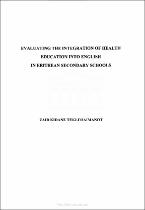| dc.description.abstract | In Eritrean secondary schools, Health Education is not taught as a separate subject. However, in order to raise the students' awareness about health, the Ministry of Education of Eritrea has integrated health-related topics into English and science. The main objective of this mini-thesis is therefore to evaluate the integration of Health Education into English in Eritean secondary schools with special reference to one secondary school. In the post-independence curriculum of Eritrea, even though the curriculum has changed to the needs and interests of the Eritreans, Health Education is not given due emphasis and teachers are not implernenting its integration into other subjects effectively. This can be due to the lack of teachers' ability and lack of orientation on how to teach Health Education/ trealth-related topics. Moreover because of the overcrowded curriculum (and hence the shortage of time for teachers to take their own initiative to implernent the integration of Health Education into English properly) they are limited in their capacity to help students learn Health Education. In order to gather the necessary data, the qualitative research method, in particular the case study, is employed. The data were collected by interviewing people in the National Curriculum Department, teachers, and students. Moreover, to triangulate the data collected from the interviews, classroom observation and document analysis were unemployed. Finally, the data collected were analysed, classifying the information into six themes: contribution of English to Health Education, emphasis given to Health Education, strategies ernployed to teach Health Education, levels of integration of Health Education into English and Biology, problerns in teaching Health Education and the status of teachers training and ongoing teacher development. The findings of the study revealed that there is a discrepancy between what the govemment has intended about Health Education, what teachers do and what students leam in reality. This is due to the lack of clear policy about curriculum integration or integrated subjects in general and Health Education in particular. In addition there is lack of teachers' training and teachers' development and hence teachers lack detailed knowledge about the integrated subjects and the methodology to teach them effectively. Moreover, there are real time constraints. The time allotted to health related topics is little, teachers teach two shifts and they are occupied the whole day and they are not encouraged to take their own initiative. The government thus needs to develop a clear policy on curriculum integration, where teachers should participate in its development its implementation. Even though the study was conducted in one school, it revealed an impression of the status of Health Education in Eritrean secondary schools: its level of integration, emphasis given to it, and problems that hinder its implementation. However, to evaluate the curriculum integration from its development up to its implantation and the factors which affect its development and its implernentation, a further study should be conducted on a larger-scale | en_US |

